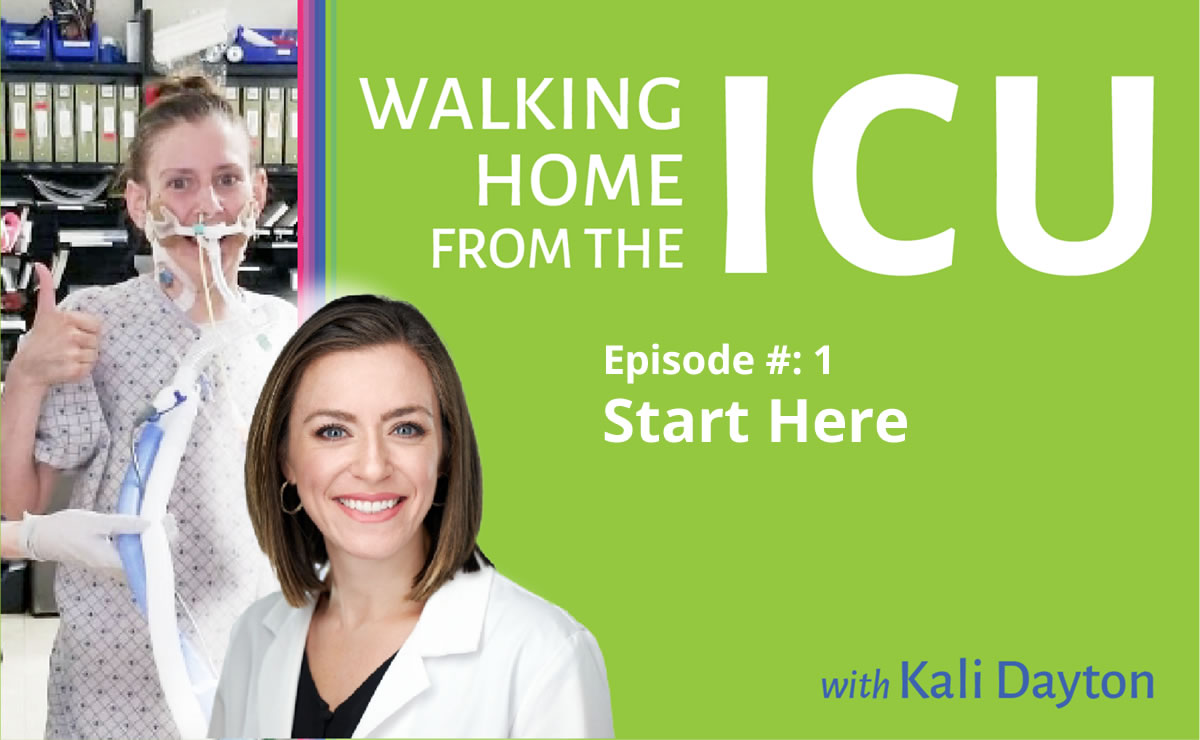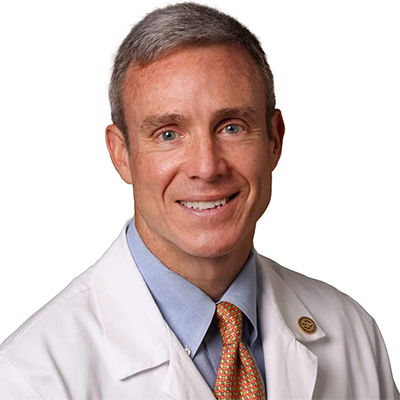SUBSCRIBE TO THE PODCAST
Kali shares the variation in sedation and mobility practices she witnesses in critical care throughout the USA. ICU survivors changed her perspective and belief in what is right and best for patients.
Episode Transcription
You are listening to “Walking Home From the ICU”. We will be exploring how to save and preserve lives in the ICU. All opinions and views shared are unaffiliated with any organization.
Hello, and welcome to our first episode. I’m a nurse practitioner. As a nurse, I started my career in an ICU that allows patients to be awake and mobile. It was normal to have patients on breathing machines be awake, sitting in chairs, communicating and walking the halls three times a day. During my first few years there, I saw less than a handful of patients end up with tracheostomies and PEG tubes, or having to be discharged to an LTACH or rehab.
When I became a travel nurse, I was suddenly exposed to the traditional practice of sedating all patients on ventilators. I once asked the doctor if I could wake my patient up and walk them and he looked at me in horror and asked if I plan to follow them with an intubation cart. It was then that I realized that our experiences and exposure ultimately influence how we manage patients on ventilators.
As a travel nurse, I shrugged my shoulders and took on the when in Rome approach and complied with the nuances that each hospital I even found myself innocently laughing at insensitive sedation nursing jokes, even though I had seen what it was like to send patients straight home from the hospital.
As a nurse, I was still unaware of the magnitude of impact our practices have on patients’ lives, families, careers, and futures. That understanding came years later as a doctorate student, the impacts of sedation and immobility were never mentioned by a single professor during my three years of graduate studies and acute care medicine. It was an actual ICU survivor on a plane ride that revealed the truth to me. When I told my companion that I was an ICU nurse, the color instantly left his face. He then spent the next hour telling me about his experience in the ICU. It sounded like he had had a perforated esophagus from a procedure that led to peritonitis and severe septic shock. He was intubated on the ventilator for weeks or more, but that wasn’t his main concern. His description of the worst part screamed to me ICU delirium.
With tears rolling down his face, he tried to explain what it was like to have his limbs nailed to the ground in the middle of a forest unable to flee from falling trees crashing down on top of him. on repeat, he later found out that it was an ear temperature probe, not a gun that was held his head every two hours. Each time he would brace himself to have his brains blown by the gun, only to hear click and left the assumption that it was out of bullets, but would be loaded next time. He couldn’t tell me everything. It sounded like what he had shared already was causing him anxiety.
He had to go to rehabilitation to relearn how to walk, talk, swallow, and eventually house tracheostomy removed. When he was finally home, he continued to relive those images of Port every time he closed his eyes. The depression and anxiety for the PTSD, along with the insomnia sent him into a psychotic spiral. He said that his ex-wife, who he referred to as the” love of his life”, had slept on the floor of the ICU for those weeks and fought it all right with Him. Yet a year post ICU, he found himself not at all himself, divorced and alone.
This discussion occurred about four years following the event. He was still unable to resume his career. And judging by the deep despair and emotion he expressed, he was not free from the trauma at 48 years old, with no real comorbidities. My new friend had declared himself a DNR DNI. He said, I know I sound really ungrateful. I feel guilty for feeling this way. I should be glad that they saved my life. But my time in the ICU, ruined my life. My marriage, career and life are ruined. If I am ever that sick again, no matter how reversible it is. I would rather die than cross a toe back into the ICU.
I sat dumbfounded and had no response beyond crying with him.I had no idea. I had worked in the ICU for five years and had never heard anything like it. I couldn’t help but think back to the dozens of patients that I had sedated as a travel nurse.I felt haunted.
This was not what I had signed up for, like almost every other professional in the medical world. I had chosen to become a nurse because I wanted to help. I aspired to alleviate human suffering and even save lives. I still didn’t know what this all meant or what to do with this information. Until I had a contrasting experience.
I was back in Salt Lake and in the cafeteria of a hospital when I heard someone yell my way. I thought I knew you. I turned around and really recognize the woman talking to me. Her face the hands with the missing fingers. And then it all came back to me. The room the ventilator, pneumonia, the anxiety, yes. She was tough. But so was I. I was suddenly living this flashback of really pushing her to walk on the ventilator, while she sat at the side of the bed and trembled with fear. At baseline, she used a motorized scooter and was really weak. So with a her acute ventilator dependence, her crystal ball had trach and PEG written all over it. Suddenly, she interrupted my thoughts with you were so mean, you, you made me walk when I was tired and scared, and I thought I hated you.
Yeah, I couldn’t deny that. And I didn’t know how to smooth that conversation over when suddenly she reached over her walker and had me in a bear hug and said, You saved my life. And I love you.
That moment, penetrated me. I remembered that her main goal and focus was to get home. what she meant by you saved my life was not that I just kept her on the ventilator. She got back to what her life meant to her. She had the value. She went home to her partner and her dogs. She taught me that that is what it means to save a life. This survivor friend understood before I did that saving lives in the ICU is done by preserving function and allowing a full restoration of their lives as a whole.
That is what this podcast is all about. It is about how to save lives, not just specific organs. The ICU I work in maintains that focus and caters all treatments to that. Therefore 98% of our survivors walk themselves out of the hospital doors and go straight home. We will be learning about this from everyone involved in the process and the ICU team. We will hear from nurses, respiratory therapists, doctors, nurse practitioners, physical therapists, pharmacists, occupational therapists, speech therapists, and especially survivors and their family members. We will talk of our experiences a little off the books as well as dive into the books.
We will be dissecting and yet simplifying current research to make it come alive and mean something I truly believe every member of the ICU wants to see our patients succeed and go on to thrive in their lives. Yet we have minimal insight into what happens to those we have served after they leave our units. Until the last few years, we have been fairly unaware of the impact of some of our ICU culture and practices. It is hard to change and we will never change unless we have reason to. If you have listened to thus far, you likely find value in patient survivorship.
For you awesome ICU nurses out there that are tired of feeling harped on about the ABCDEF bundle, CAM scoring, early mobility, etc. Don’t go we all have something to learn from each other. Please listen to our survivors. Keep an open mind as we explore our practices in the ICU. We’re going to be thinking outside the box. We’re going to hear from people who are doing things we didn’t even think were possible. That should be exciting to us see the possibilities. Let’s explore and reconnect with the altruistic roots of our journey to being in the ICU. When we truly understand the why we will find our house
Transcribed by https://otter.ai
SUBSCRIBE TO THE PODCAST



 When patients are so ill that they require a ventilator in the ICU, the antiquated approach of heavy sedation and immobilization should be avoided in order to help prevent the immense burden of physical and cognitive disabilities suffered during survival. To understand this better, listen to Walking Home From The ICU. You will see what ICU consultant Kali Dayton provides to your team.
When patients are so ill that they require a ventilator in the ICU, the antiquated approach of heavy sedation and immobilization should be avoided in order to help prevent the immense burden of physical and cognitive disabilities suffered during survival. To understand this better, listen to Walking Home From The ICU. You will see what ICU consultant Kali Dayton provides to your team.